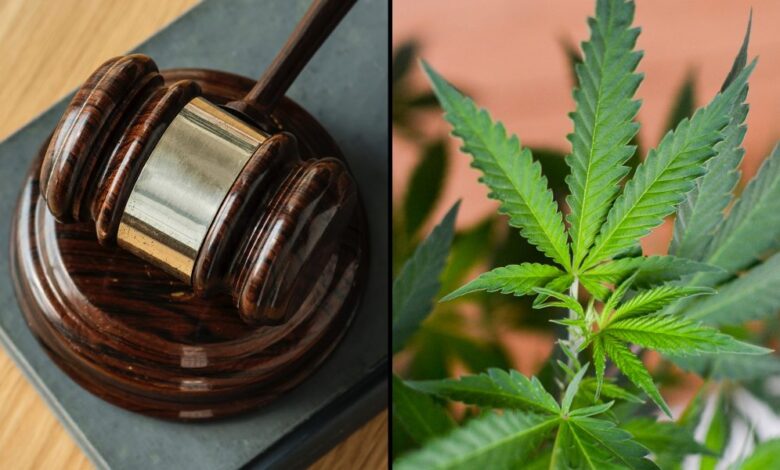Supreme Court Asked To Settle Differing Interpretations Of Federal Medical Marijuana Protections Amid Lower Court Discrepancy

In a case that would assist make clear the boundaries of a federal regulation that protects state-legal medical marijuana exercise from prosecution by the federal authorities, a Maine man is asking the U.S. Supreme Court docket to assessment a dispute through which the U.S. Division of Justice (DOJ) investigated and subsequently charged him below the federal Managed Substances Act (CSA).
In a petition to the excessive court docket filed final week, Lucas Sirois asserts that the Rohrabacher–Farr modification, which has been enacted into federal regulation through spending payments since late 2014, ought to stop DOJ from pursuing its case in opposition to him. The U.S. Court docket of Appeals for the First Circuit beforehand dominated in opposition to Sirois, however his attorneys assert that was in error.
Sirois was charged in 2021 with “a laundry listing of offenses” stemming from his enterprise as a licensed medical marijuana supplier, his petition says. Since his arrest, he’s protested that his prosecution is in violation of the Rohrabacher–Farr modification, an appropriations rider that forestalls DOJ from spending cash “to forestall [states with legal medical marijuana] from implementing their very own legal guidelines that authorize the use, distribution, possession, or cultivation of medical marijuana.”
Within the Supreme Court docket petition, Sirois argues that “the federal government’s actions on this case violate Rohrabacher-Farr leading to DOJ spending funds not appropriated by Congress. Due to this fact, DOJ’s actions have been invalid and the Court docket of Appeals for the First Circuit have to be reversed.”
Whereas it’s as much as Supreme Court docket justices whether or not to take the case, the petition notes that there’s at the moment a cut up between First Circuit and Ninth Circuit courts with respect to the marijuana rider. Such conflicts usually enhance the probability that the Supreme Court docket will weigh in.
“This case presents a possibility for the Court docket to resolve the circuit cut up and supply a definitive interpretation of Congress’s language,” the petition says, contending that justices “can settle the substantial uncertainty that exists associated to the protections afforded to the medical marijuana sufferers, distributors, cultivators, and regulators pursuant to the Rohrabacher-Farr modification.”
Sirois obtained a medical marijuana caregiver license in Maine in 2010 and later obtained a historic constructing in Farmington that he transformed right into a hashish cultivation facility, in response to his petition. Particular person caregivers rented rooms within the constructing and offered marijuana at wholesale costs to Sirois’s enterprise, Lakemont LLC, which then offered it to sufferers.
In 2018, a suspect in a separate investigation talked about Sirois as somebody “with an especially giant develop operation,” it says, which prompted DOJ to open an investigation. In 2020, the Drug Enforcement Administration (DEA) raided the power, with an agent claiming in his utility for a search warrant that the Rohrabacher–Farr modification “doesn’t apply [because] members of the conspiracy site visitors in each marijuana and cocaine.”
Although no proof of cocaine-related conduct was ever discovered, the petition asserts, the federal authorities filed fees “associated to his cultivation and distribution of marijuana below the CSA.”
Regardless of Sirois elevating the Rohrabacher–Farr protection, the trial court docket dominated in opposition to him, concluding {that a} “affordable thoughts” would possibly agree that DOJ’s investigation of him was warranted due to his obvious noncompliance with a 2011 state regulation prohibiting medical marijuana “collectives.” (Sirois argues that his conduct fell outdoors the technical definition of collectives and concerned solely “permissible, non-collective preparations and actions,” noting that state regulators didn’t discover him to be in violation of state laws in the course of the DOJ investigation.)
Sirois appealed the ruling to the First Circuit, which ultimately sided with the federal government and affirmed the district court docket ruling.
In its opinion, the First Circuit stated that “the celebration in search of an injunction pursuant to the Rohrabacher-Farr Modification bears the burden of demonstrating that the challenged DOJ motion would ‘stop a state from giving sensible impact to its medical marijuana legal guidelines.’” Additional, it stated proof within the case “tended to point out” that Sirois was the truth is working as a collective in violation of Maine’s personal laws.
The brand new Supreme Court docket petition contends that ruling hinged on “two important errors.”
“First, it required the defendant to, primarily, show his or her innocence as an alternative of creating the federal government show that its investigation and prosecution had continued justification adequate to expend appropriated funds,” the submitting says.
Moreover, it provides, the court docket “didn’t outline the contours of that customary or present considerable steering to prison defendants as to learn how to show such ‘substantial compliance.’”
Attorneys for Sirois name that final result “not tenable,” writing within the temporary: “Present and potential contributors in Maine’s medical marijuana program deserve readability as to what displaying have to be made to determine substantial compliance.”
As for the cut up between the First Circuit and Ninth Circuit, the petition says that whereas the First Circuit requires a defendant to point out “substantial compliance” with state legal guidelines and laws, the Ninth Circuit in a associated case stated that people should show the next customary—strict compliance—with state regulation.
“Due to this fact, now we have a transparent divergence between the 2 Courts of Appeals which have addressed it as to the fundamental customary relevant to defendants in search of to enjoin prosecutions below Rohrabacher-Farr,” Sirois’s petition says. “This challenge shall be dispositive to many potential defendants and decide whether or not they’ll face an intrusive, disruptive, and prolonged prison investigation and prosecution.”
Additional, it asserts that “whereas the First Circuit’s ‘substantial compliance’ take a look at would sound extra favorable to prison defendants than the Ninth’s ‘strict compliance,’ neither gives potential prison defendants with the safety Congress promised to them through the Modification. And neither court docket has supplied potential prison defendants with any workable and predictable customary in opposition to which they might choose whether or not they could possibly be topic to federal prosecution.”
Sirois’s attorneys say that as a result of the Rohrabacher–Farr modification makes use of the phrase “none,” an excellent greater customary applies.
“It appears as if neither Circuit might think about a world through which Congress needed the Federal Authorities to maintain its nostril out of state-authorized medical marijuana packages and permit the States to control and police their very own residents when violations occur,” the petition says, including: “To the First Circuit, it was inconceivable that ‘not one of the funds’ might truly imply ‘none.’”
Even when some duty lies with defendants to show compliance with state legal guidelines and laws, it continues. “below the First Circuit’s take a look at there isn’t a clear steering to defendants as to how they will present the requisite degree of compliance.”
“This court docket must step in not solely so there may be one rule that may predictably information conduct,” it urges justices, “however in order that the rules of separation of powers and federalism are protected by a correct interpretation of the Modification.”
In accordance with the petition, the questions offered within the present case are threefold. First, “below what circumstances might the Division of Justice criminally examine and prosecute a person who’s licensed or in any other case approved to make use of, distribute, possess, or domesticate medical marijuana?” Second, is it the duty of the federal government or the defendant to show noncompliance or compliance, respectively, with state medical marijuana legal guidelines and laws? And third, what’s the correct take a look at to show both strict or substantial compliance?
The petition within the case, Sirois v. U.S., was first reported by Law 360. A response from the federal government is due by March 17.
In an October op-ed for Marijuana Second, lawyer Christine Baily, who beforehand served as the primary normal counsel of the Massachusetts Hashish Management Fee, stated the First Circuit choice within the case “underscores the challenges prison defendants will confront in convincing federal district courts that they need to challenge an injunction in opposition to prosecutors.”
“Prison defendants should show substantial compliance with state medical marijuana legal guidelines and laws, however possession of a license alone will probably be inadequate,” she wrote on the time, including that it’s additionally “unlikely that state regulators will testify or present proof supporting compliance even when the company issued, renewed or reinstated a license or decided that the licensee handed inspection in the course of the time of the alleged CSA violations.”
In December, in the meantime, a First Circuit panel heard oral arguments in a case that cuts to the center of federal marijuana prohibition, with plaintiffs contending that the U.S. authorities lately has deserted its makes an attempt to rein in what it nonetheless considers a federally unlawful substance, citing as proof the Rohrabacher–Farr funds rider.
Photograph components courtesy of rawpixel and Philip Steffan.




